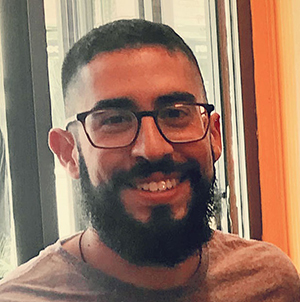Paul Levy is a graduate student at Indiana University–Bloomington, where he also earned a Master’s of Public Health, Environmental Health.
Paul Levy won the 2021 Latino Faculty and Staff Graduate Student Award for his efforts in contributing to a positive campus environment, demonstrating exemplary academic and professional work, and participating in service, mentoring, and promoting diversity initiatives that enhance and support Latinos on campus.
Paul Levy is a graduate assistant with the Faculty & Staff for Student Excellence Mentoring Program (FASE) and Mentoring Coordinator with the Office of Vice President for Diversity, Equity, and Multicultural Affairs. Paul’s responsibilities include monitoring, assessing, and evaluating co-curricular programming and its impact on student development, as well as strategic assessment of undergraduate student retention and graduation factors. He also connects FASE mentors with tips, strategies, and recommendations to enhance and improve relationships with their first-year students
Paul is also a current Graduate Affiliate with the Center for Research on Race & Ethnicity in Society (CRRES). In this role, he highlights current Latino health disparities in research and works to elevate current efforts taking place within the research community. In June 2021, he was named recipient of the Éxito! Latino Cancer Research Leadership Training, a five-day fully funded summer institute to explore careers in Latino Cancer Health Disparities, research strategies, and tools to apply to a doctoral program.
Currently, Paul is working closely with Dr. Jacqueline MacDonald Gibson, Professor and Chair of the Department of Environmental and Occupational Health at Indiana University–Bloomington, on an EPA grant, "Predicting and Communicating PFAS Exposure Risks from Rural Private Wells." PFAS (per- and polyfluoroalkyl substances) are chemicals behind a number of modern conveniences, such the coating on many nonstick pans, wrapping on fast food so that grease does not seep through, and active gear and clothing that is water repellant, which are believed to cause numerous health problems, including high cholesterol, interference with hormones, and even cancer. As a graduate assistant, Paul serves as the primary coordinator and trusted intermediary among key community partners in North Carolina to set mutually beneficial objectives and project goals. He is developing subject matter expertise in PFAS and risk communication to respond to regionally specific challenges from each community.
An active member of the Latino Male Initiative (LMI), Paul attends meetings virtually and provides resources such as scholarship, internship, and professional development tools to the LMI community. He supports La Casa in recruiting external guest lecturers. In addition, he volunteers for the Substance Abuse and Mental Health Services Administration (SAMHSA), aiding in Spanish translation for the Prevention Insights Technical Assistance Project. He has translated Spanish feedback responses from various SAMHSA Technical Assistance Centers into English.
"Beyond serving as a positive role model, Paul works hard to promote diversity initiatives that support Latinos on campus, and he participates in numerous service and mentoring activities toward that end," says Dr. David B. Allison, Dean, School of Public Health, Indiana University–Bloomington.


